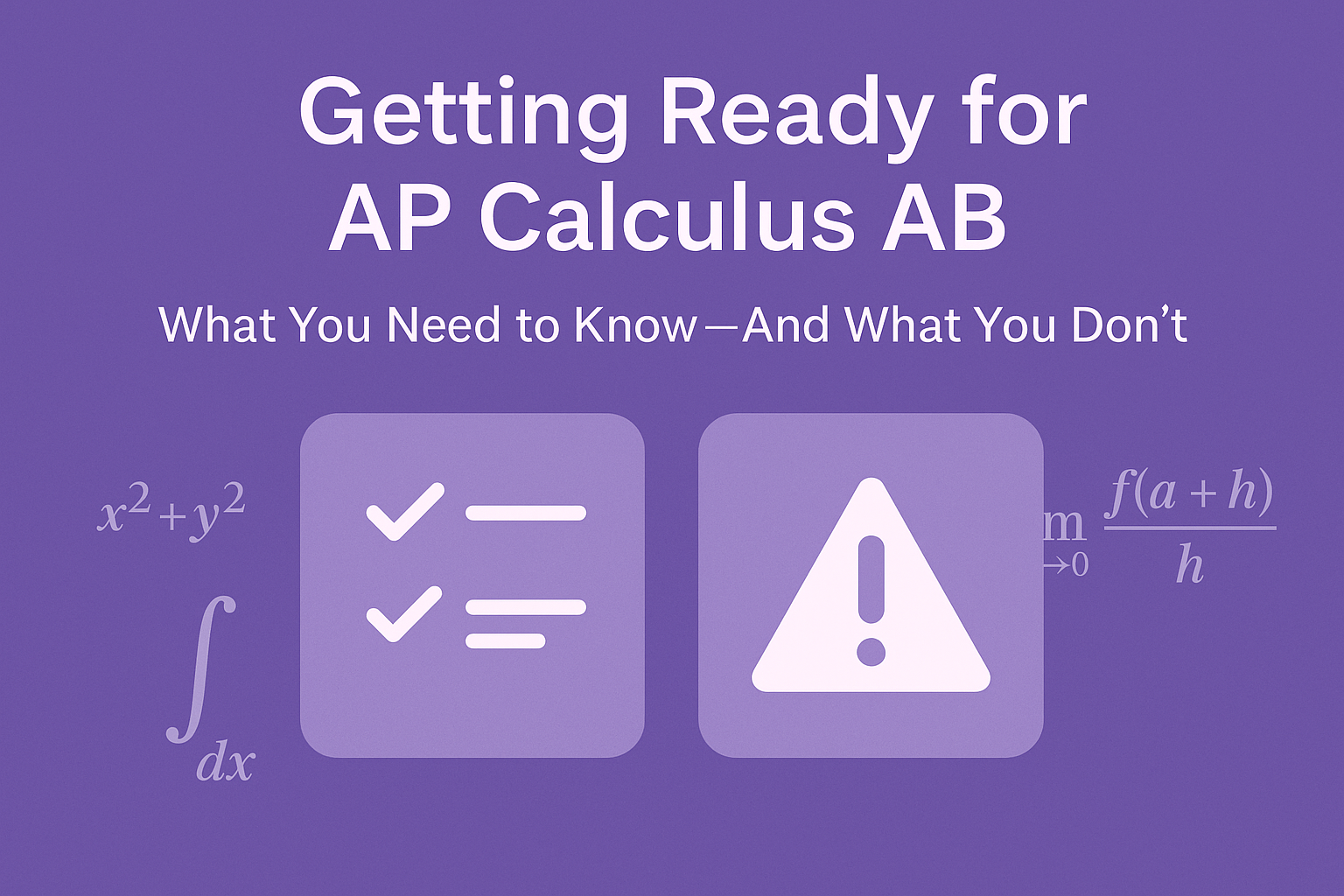How to Prepare for AP Calculus AB: A Student’s Guide to Getting Ahead
What you really need to prepare for AP Calculus AB
AP Calculus AB is one of the most challenging—and rewarding—high school math courses. It opens the door to college-level problem solving, introduces you to the language of change, and lays the foundation for fields like physics, engineering, economics, and even biology.
But before you start worrying about derivatives and integrals, let’s clear up a big misconception: you don’t need a full year of Pre-Calculus to succeed in AP Calculus AB.
The Prerequisite Myth: Is Pre-Calculus Required?
Many students (and even some counselors or teachers) believe that Pre-Calculus is a strict prerequisite for AP Calculus AB. The truth? While Pre-Calculus covers some useful topics—like trigonometry and exposure to different types of functions—it’s not the deciding factor in whether you thrive in Calculus.
In fact, most Pre-Calculus topics (like conic sections, polar coordinates, or advanced logarithmic properties) either play a minor role or don’t appear at all in AP Calculus AB.
So what does matter most?
Algebra Is the Real Foundation of Calculus
The number one predictor of success in AP Calculus AB is how strong and efficient your Algebra 1 and Algebra 2 skills are.
It’s not enough to “understand” algebra—you need to be quick, accurate, and confident. Calculus moves fast, and if you hesitate on algebra steps, it can slow down (or block) your progress.
Here are the algebra skills every future AP Calculus student should master:
Factoring: trinomials, difference of squares, grouping—fast and flexible
Solving equations: linear, quadratic, absolute value, exponential, rational
Systems of equations: solving and interpreting solutions
Functions: domain, range, composition, inverses, word problem translation
Graphing & interpreting: increasing/decreasing behavior, asymptotes, intercepts
Exponents & radicals: rules, rational exponents, simplifying efficiently
Manipulating expressions: simplifying, expanding, rearranging terms without hesitation
Think of Algebra as the structural framework of a house—if the base isn’t solid, the “top floor” of Calculus can’t stand strong.
The Role of Trigonometry
There’s one Pre-Calculus topic you do need: Trigonometry.
For AP Calculus AB, make sure you’re comfortable with:
The unit circle and common angle values
Graphs of sine, cosine, and tangent
Key trig identities (Pythagorean, double-angle, reciprocal)
Solving basic trig equations
The good news? You don’t need a full year of Pre-Calculus to learn these. A focused summer prep course, review packet, or targeted tutoring can give you the trig foundation you need.
Why Speed and Accuracy Matter
In AP Calculus AB, understanding concepts is only half the battle. The other half is applying them quickly and correctly under time pressure. On the AP exam, you’ll need to:
Instantly recognize problem types and strategies
Set up and solve equations efficiently
Graph and interpret functions without hesitation
Keep pace with both multiple-choice and free-response questions
In short, timeliness and accuracy are just as important as understanding.
Final Thoughts: Setting Yourself Up for Success
If you’re preparing for AP Calculus AB, start with an honest check of your algebra and trig skills. Ask yourself:
Can I solve equations confidently without looking at notes?
Do I simplify and manipulate expressions quickly?
Am I fluent with functions and graphs?
Do I know the basics of trig?
If the answer is “not yet,” don’t panic—just start practicing now. Strengthen your algebra foundation, brush up on trigonometry, and build speed through daily review.
Remember: AP Calculus AB isn’t about being a “math person.” It’s about showing up prepared, with the right tools and the confidence to use them. Master your algebra, sharpen your trig, and you’ll be more than ready to thrive in Calculus.

